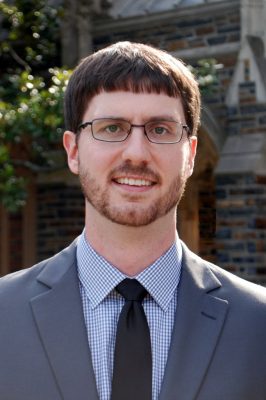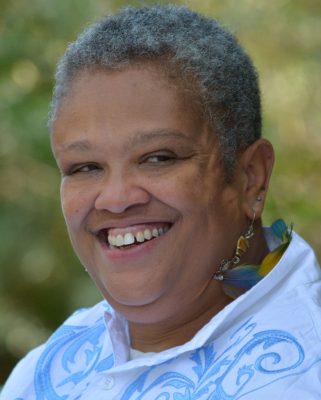CALL Offers Innovative Online Courses
Watching war movies, reading science fiction and examining Zen Buddhism aren’t your typical seminary fare, but they are among the many innovative, online continuing education courses available at CDSP.
The Center for Anglican Learning and Leadership (CALL) offers online courses during winter, spring and fall sessions that allow students to go at their own pace and learn at a time convenient to them. Courses are seven weeks long and are open to everyone, lay or ordained.
David Cunningham, a member at St. Clement’s Episcopal Church, Berkeley, and former director of planned giving at the University of San Francisco, is effusive about the CALL program.
“My wife, Claire, and I have taken two courses, Brian Taylor’s ‘The Empty Way’ and John Kater’s ‘Anglican Theology,’” Cunningham said. “Both were very rich in content and most stimulating and inspiring.”
Taylor’s course, “The Empty Way: Contemplative Christianity and Zen Buddhism,” was offered in the fall of 2015 and will be offered again in the spring of 2017. It explores the spiritual practices of contemplative Christianity and Zen Buddhism, including an openness to life as it is, compassion towards others, and freedom from anxiety-producing habits of mind.
“This course is not specifically Episcopal,” said Taylor, who served for 30 years as rector of an Episcopal congregation in New Mexico and has studied and practiced with a variety of Zen Buddhist teachers in San Diego, Albuquerque and Chicago, where he now resides. “This course puts together a Christian and Buddhism landscape and looks at the overlap. Today there are just so many people interested in Buddhism.”
Cunningham said the course helped further his and his wife’s own Christian formation.
“We found the course content a powerful tool for another approach to our Christian faith journey,” Cunningham said. “Brian showed us, via a video, how to sit in Zen meditation and why. He then guided our work to connect this contemplative experience to our spiritual learning.”
As part of the class, students were required to meditate each day. The Cunningham’s devoted 20 to 30 minutes a day to meditation, and “we still meditate now several months after the course ended. I wish Brian would teach another class. He is an excellent teacher.”

In an upcoming class titled “War in Film and Faith,” participants will explore whether it is possible for disciples of Jesus Christ to participate in or approve of war. And if so, under what circumstances? The course, taught by Dr. Bradley Burroughs, will approach these questions through the lens of contemporary films—both fiction and documentary—that portray key aspects of war. The films will be augmented with readings that deepen students’ understanding of the rich history of Christian reflection on war.
“The films ideally are intended to open up certain questions and issues related to the ethics of war,” said Burroughs, a former CDSP professor who now lives in Dayton, Ohio, and teaches at United Theological Seminary. “For instance, the first film we watch is ‘Glory.’ When I had full-time students in Berkeley, most were inclined toward a form of pacifism. ‘Glory’ is intended to open up the question, might there be a time when war is just? This film portrays a war that has as strong of a claim to justice as any, in my opinion.”
In addition to “Glory” (1989), students will watch and reflect on one movie per week, including: “American Sniper” (2014); “Defiance” (2008); “Zero Dark Thirty” (2012); “Wag the Dog” (1997); “Selma” (2014); and “Restrepo” (2010).
Burroughs had an abundance of films from which to choose. So he chose ones that were easy for students to access online and that best addressed the questions he had in mind.
“For instance, I wanted to consider moral injury, which is not just PTSD (post-traumatic stress disorder), but also war injuries in the larger framework—the idea that by participating in a certain act, you feel that you have damaged your own ability to do good or be good. This is of immense significance for those ministering to soldiers and returning soldiers.”
For that issue, he chose “Restrepo,” a documentary that chronicles the lives of men from the beginning of their deployment in the Korengal Valley of northeast Afghanistan (at the time, regarded as one of the deadliest places on earth) until their return home.
“It’s a really powerful movie about how the ways the effects of war continue long after the general public has stopped thinking about it,” Burroughs said. “When soldiers come back, we’re not so good at thinking about the enduring consequences of what we have asked those people to do on our behalf.”
Burroughs said courses that deal with contemporary issues challenge the faith formation of laypeople and clergy alike.
“What I would say about my courses is there are right or wrong answers, and we are too quick to say there is no right or wrong. I certainly hope when you walk away from this course that you can make your case in a way that is faithful to Christian scripture, tradition and reason.”

Looking ahead to the fall of 2016, science fiction writer Michelle Murrain will teach a course called “Sci-Fi Faith.” A primary text for the course will be “The Sparrow,” by Mary Doria Russell, a book about the first Jesuit mission to a planet inhabited by intelligent life. The course will also include short stories and non-fiction readings.
“We’ll be talking about the themes in science fiction that have to do with God, creation, the ways in which religion manifests in human beings and may manifest itself in the future,” said Murrain, who lives in Healdsburg, California. “There’re lots of ways in which religious concepts have made their way into science fiction since the beginning.
Murrain, who has a Ph.D. in biology and a certificate of theological studies from the Pacific School of Religion, has written numerous science fiction books and currently works as a relationship coach.
She said the Sci-Fi Faith course will consider existential questions about the universe and human nature.
“Most of religions are human and earth bound—Jesus came to earth to save humans,” Murrain said. “So what does it mean if there are aliens and what is God’s relationship to them? So it forces us to think a little bit bigger than we may have before. It will really expand our sense of who is God and what God is responsible for.
“We’ve never seen aliens, but the universe is very large. Chances are there are other living creatures out there. So what is God’s relationship to them?”
Taylor, who teaches the contemplative prayer and Zen Buddhism course, said the CALL program answers a very specific need faced by many people of faith today.
“It’s not always easy to engage a lot of your parishioners in significant adult formation,” Taylor said. “You can offer courses on weeknights, Saturday programs, or Sunday forums, and often the only thing possible in these settings is a ‘101’ level of formation. It is difficult to go deeper. In a congregation, there will only be a small number of people who want to or can participate.
“On a national level, such as in CALL courses, you can go into depth in a way you can’t do in a parish,” Taylor said. “ There are people spread around all over the church who are looking for more in-depth experience but they can’t get it unless you go online.”
As a past participant in two of the CALL courses, Cunningham said, “I think this is a very vital way to the future for our church. It is easy to log on; the conversations make you really think; and the new experience learned, especially via the Zen experience, changes attitudes and bad habits. I breathe first before getting upset in traffic. Claire is most pleased about that!”
For more information about upcoming CALL courses, go to https://cdsp.edu/center-for-anglican-learning-and-leadership/call-online-spring-2016/. Continuing Education Units are offered for CALL courses at the rate of 2 CEUs per course. Spring courses run April 11 through May 30

